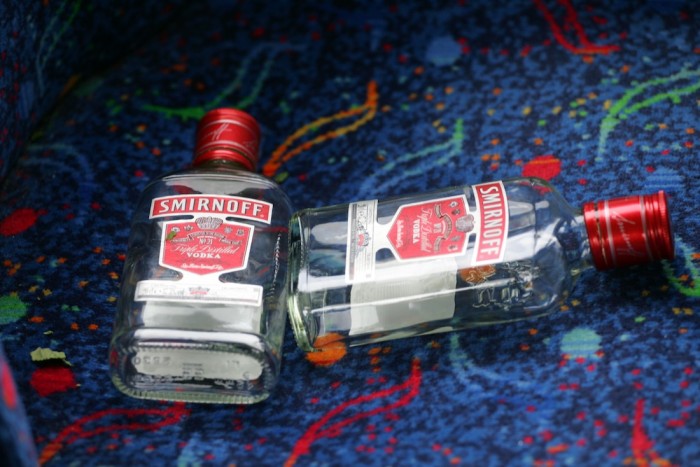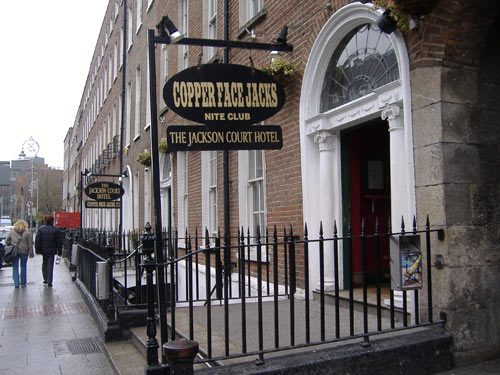Rachel Fleming | Contributing Writer
“I came to college to learn” one Trinity fresher recently posted on Facebook. “Things I have learned: it is possible to feel hungover at 3 am in the morning.”
This is not an uncommon tale. The first few months of college are a unique educational experience, characterised by experiments with Tesco Value vodka and surveys of the various prices of naggins available on Grafton St. Alcohol is generally accepted as an integral part of the college experience. No 9 am tutorial is complete without a dishevelled latecomer and an extra-large Americano in hand, and no society event is worth attending if there isn’t a free wine reception afterwards. Everyone graduates with at least one story about the time they flashed the bouncers at Workman’s or the time they pissed on the Provost’s house.
The wide-eyed and nervous fresher quickly learns that the best way to make friends is by getting hammered with a few people they vaguely recognise from lectures, and then shifting the face off them in Coppers.
The wide-eyed and nervous fresher quickly learns that the best way to make friends is by getting hammered with a few people they vaguely recognise from lectures, and then shifting the face off them in Coppers. The social recluse finds themselves transformed into the life and soul of the party, only to wake up the next morning and find themselves tagged in several hundred bathroom selfies with complete strangers. It’s generally the way socialising in college works. If you’re not friends now, you will be after you’ve carried each other home.
What then of the students who don’t drink? The ones who, for reasons religious, medical or otherwise, decide to abstain from alcohol? Do they go out? How do they make friends? Do they even have any friends? Most intriguingly of all, how many of them exist? According to a report published by the National Institute on Alcohol Abuse and Alcoholism, approximately 20% of college students don’t drink, so statistically, every fifth person you meet should be a teetotal.
approximately 20% of college students don’t drink, so statistically, every fifth person you meet should be a teetotal
General experience of college life however, would suggest a far lower number. It’s rare to meet someone who has actively made the decision not to drink and isn’t just having a sober night or a dry spell, but it seems there are more than we think. So where are they? Are all the people who routinely claim to be on antibiotics just too afraid to admit their lifestyle choices? Do they sip on a Coke and pretend there’s vodka in it, while making claims of being a heavyweight, in order to avoid ostracisation?
Do they sip on a Coke and pretend there’s vodka in it, while making claims of being a heavyweight, in order to avoid ostracisation?
“Most people just look surprised and say cool when I tell them I don’t drink” says Hannah Crowley, a drama and Spanish student. “No one has ever given me a hard time about it, which is really nice. I still do frequent the clubs and I enjoy myself, because I like dancing, but it all goes a bit downhill when I have to start keeping track of my drunk friends. It’s only enjoyable to a certain extent.”
The amusement of laughing at drunk people wears off after about ten minutes and the fear of getting puked on becomes all too real
Shauna Gavin, a first-year science student, who was recently forced to give up alcohol due to medical issues, agrees. “The amusement of laughing at drunk people wears off after about ten minutes and the fear of getting puked on becomes all too real. At that point, at home in bed seems like the safest place in the world.”
If you need to rely on alcohol to have a good time, it doesn’t say a lot about your character
It’s a commonly accepted fact that nightclubs can only be tolerated when drunk, either due to the atrocious music (for some reason Katy Perry comparing herself to both a lion and a tiger in the same breath no longer seems like lazy writing and scientific inaccuracy, but the work of a lyrical genius when it’s played in The Palace) or the lecherous 30 year olds. So, the sober brigade can hardly be blamed for their avoidance. But does this affect their ability to socialise? “90% of college events organised revolve around drinking” says Shauna “and while there’s nothing stopping me from going to them, once you turn into as big a dry shite as I have, they sort of lose their appeal.
As the ‘sober one’, it generally falls to me to fetch glasses of water and make sure that they don’t vomit
Hannah’s approach is somewhat different. “If you need to rely on alcohol to have a good time, it doesn’t say a lot about your character. I don’t judge anyone for drinking but most people seem to think that the more alcohol you consume, the better night you have. The problem is that once you start needing someone to look after you, you’re stopping them from enjoying their night too. As the ‘sober one’, it generally falls to me to fetch glasses of water and make sure that they don’t vomit, and while I don’t mind doing it once in a while, if you’re responsible enough to drink, you should be responsible enough to look after yourself.”
it still must be a difficult lifestyle to maintain in an environment which promotes the consumption of alcohol to such an extent as ours
Most of us have been both the sober shoulder to lean, as well as the drunken mess in need of assistance so a certain amount of empathy is present when it’s your night out being restricted. However Hannah tells me that she never really participated in the drink culture before making the decision to go teetotal, while Shauna admits that she “used to drink way too much, and dance till 4 am and shift every guy in the club.” Perhaps it’s these different experiences which caused the opinions of the two to vary so much, but at the same time, it’s easy to imagine how frustrating it must be to be the sole voice of reason among a group of intoxicated students. So why do they do it? For both of the girls, health seems to be the biggest issue. “Your body is your body” says Hannah “And while going on a bit of a bender sometimes is great, in the long run, not so much.”
“Your body is your body, and while going on a bit of a bender sometimes is great, in the long run, not so much”
Sensible words, but it still must be a difficult lifestyle to maintain in an environment which promotes the consumption of alcohol to such an extent as ours. I ask Shauna whether or not she’d advise the average college student to give up the excesses of alcohol in favour of a life of sobriety. She laughs. “Don’t do it. 0/10, would not recommend. Be a drunken hooligan, it’s way more fun.”









